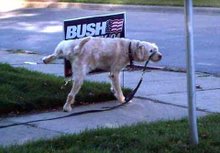
Of course anyone who has lived more than 18 seconds on the North American prairie knows that Federal tax dollars are encouraging landowners to kill native prairie. Of course the US Fish and Wildlife Service will view this as a way to partner with people rather than fighting these bastards to stop the carnage. Thats how things operate now that testosteone has been sapped from the agency.
GRASSLANDS: Federal money prods farmers to convert fields -- GAO E&E Publishing Story Tools
Allison Winter, Land Letter reporter
This story first appeared in E&ENews PM.
Federal subsidies have encouraged U.S. farmers to plow up millions of acres of grasslands and convert them to row crops, according to a new report released this week by the Government Accountability Office.
The report found that farm program payments are an "important factor" in producer decisions to convert grasslands. In response, Senate Agriculture Committee Chairman Tom Harkin (D-Iowa) said he intends to include a requirement in the new farm bill that would cut off federal support for anyone who plows up prairies.
"We need to have farm policy that protects farmers and the environment from unintended consequences," Harkin told reporters Tuesday.
Currently, farmers can receive crop subsidies, crop insurance and disaster payments for crops planted on former grasslands. Harkin wants to cut off all three of those in his "sodsaver" requirement in the farm bill. The House-passed farm bill has a less stringent measure that would cut off only crop insurance.
Sen. John Thune (R-S.D.), whose state was highlighted in the GAO report, said in an interview Tuesday he would support the sodsaver requirement as long as it has a "balanced approach" that "fits with the reality of the planting practices of the last 30 years."
Farmland conservation and wildlife groups are supportive of the more robust protections for grasslands, which provide vital habitat for birds and other wildlife and help protect watersheds from runoff.
The United States lost almost 25 million acres of privately owned grasslands from 1982-2003, according to the report. While some of those acres went into development or other land uses, the chief use was for cropland.
New crop technology and rising crop prices, spurred by the growing demand for ethanol, have inspired farmers to plant crops on acres that were once considered marginal or unsuitable for crops.
The grassland conversion is leading to even higher federal disaster and insurance payments, according to GAO.
In a case study of South Dakota farmers, GAO found that the 16 counties with the highest grasslands conversion rates received 40 percent of all disaster payments from 1998-2004. Crop insurance payments in those counties over the past 10 years were also twice as high as other counties with less grassland conversion.
Federal subsidies for these conversions may be working at "cross purposes" with conservation programs, according to GAO. From 1982-1997, South Dakota farmers enrolled 1.69 million acres in the Conservation Reserve Program but converted 1.82 million acres to cropland.
"Current policy has one foot on the accelerator and one foot on the brake," said Ferd Hoefner of the Sustainable Agriculture Coalition, which supports Harkin's sodsaver proposal.
Current farm policy includes a less stringent "sodbuster" provision that requires producers to use certain soil conservation systems if they receive federal payments to plant highly erodible land that was once grassland. But GAO said the effect has been marginal because much of the native grasslands that farmers have converted did not qualify as highly erodible.
New farm bill deadline set
Harkin said he expects his committee to vote on the farm bill before the Oct. 6 Columbus Day recess, even if he does not have more money from the Finance Committee by then.
"I can't wait on them," Harkin told reporters Tuesday.
But while Harkin vowed to move his bill through committee in the next three weeks, he also held open the door for the possibility that he might just extend the current farm bill if he cannot find enough support for his rewrite.
"I am not unalterably opposed to extending the present farm bill." Harkin said. "We are going to try to do a new bill."
He said bypassing the committee process to bring the House-passed farm bill straight to the floor is an "option," but he does not expect to go that direction.



No comments:
Post a Comment